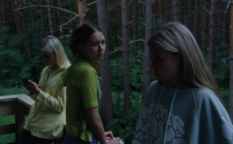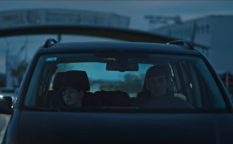Manolis Mavris: “Even the queen is powerless in the context of the beehive”

In its core “Brutalia, The Days of Labor” is about the solitude, and about how individuals’ identity is sacrificed for the sake of the common good.
For his black comedy/ pseudo-documentary/fable-parable-allegory* Brutalia, Days of Labour Manolis Mavris has won Canal+ Award for Short Film at the Cannes Festival earlier this month, where it screened in the Critics’ Week competition.
In his magnifically plotted short which borrows the elements of horror and musical genres to build a full-blooded drama, Mavris imagines a world in which bees are replaced by humans in a society marked by strict laws of obedience and super-productivity imposed by the ruling oligarchy. That world is predominantly feminine, but Mavris is not after the question of gender, or what ifs. His curiosity wanders in other direction – sacrifice of individuality for the benefit of collectivism, something that is inseparable from our modern day exsistance, particularly in relation to the contemporary work ethics.
Brutalia, Days of Labour is made with humor, cynicism and intelligence. A multitude of influences from the ancient philisophy and world literature can be read from it, but also the criticism of the mechanisms of power and aggressive labour ethical policies. At the same time, the film is making clear that even those on power can be powerless in the system they dictate.
Me met the Greek filmmaker in Cannes to discuss his inspiration for the movie, the choices surrounding the shooting venues, and the unique look of his protagonists, and the setting.
“Brutalia, Days of Labour” is a powerfully crafted film that takes on many contemporary, relevant issues by looking into a human beehive.
The story is complex enough and multi-layered from the moment that I discovered I was going to make this allegory with bees which openes the window to a space in which I could talk about very different subjects that couldn’t be linked in any other way. As you said, I could combine the diverse elements. The heterotopia is based in a form of military camp, it’s a different place from their real society, and they have their own rules. You have the matriarchal family, but also the uniforms and the strict oligarchy which is the subject to the queen. There were many aspects that could be touched upon through this construct. The story of the bees is quite simple because for the narrative purposes there is one person that you need to follow from the beginning to end. I thought that it would be interesting to see through the eyes of a worker bee to comprehend their universe better, thus creating the option to address different subjects, for instance the stoning scene. I had a reference to similar incidents that took place in ancient Athens, where the crowd would kill a person on the spot without any reprecussions, because that’s how the mass (still) functions. Think of violent incindents involving many people, or protests that escalate into something else.
I interpreted it again in the political context of our contemporary society which is slowly killing off all kinds of social benefits, for instance – pension. When you stop working, you are worth nothing.
Society doesn’t let the weak remain. If you are not functional you are useless.We have idealized the model of the beehive as the super productive community whereas when it comes to ethics, there are many questions that arise such as: who is functional? who benefits from the über-productivity? Is there a place for individuality?
The way drones are represented in the film is hilarious: beer-drinking, idling, horny men who compete for the honor to ly with the queen. You are playing with the exaggerated masculinity treats. Can you elaborate on that?
That came from my military experience because I remember the men who stayed in the army during the absence of war. Since there is no war, there is really no reason for them to be there. Likewise, the drones don’t really have a reason to exist, so they need to showcase their masculinity. The parcour run was not only inspired by the similar exscercise you do in the army, but equally by the silly television shows in which people have to master a number of obstacles to win something. At moment it feels like the film is misandrist, but I don’t think that it plays on that card.
It is more a question of absolute power.
In a way it is, but even the queen herself is powerless in the context of the beehive, because she needs to give birth to thousands of babies a day. Which means she is deprived of personal freedom, and she is trapped inside of the system even if she’s leading everyone else in the community. There is no way out for anyone. She is replaced by the new queen in the end, at the moment when she can not deliver what’s needed of her anymore.
Can you tell us something about the technical aspects? You had to shoot on different locations.
Yes. At the beginning, I was set to film in Hungary but because of the costs we had to relocate to Greece. There wasn’t one single location that would cover every need, so we split the film among different locations due to the adequacy of the architecture. Making a robust cinematic universe, you need to find the language that feels authentic, and seemingly united in one place. Covid-19 was also a huge part of the problem. Additonally, the costs were quite high for a short film, and it took us a long time to raise the funding. It’s a co-production between Greece and Belgium, and I think that was the most difficult part.
Why did you opt for very feminine wigs?
It was the referrence to the North Korean People’s Army in the visuals that we have, and on the other hand, we wanted to make them look identical, the way we see the bees without being able to distinguish between them. It was a very formalistic visual identity which is also something given in military uniforms. The wigs can be seen as a touch of humor, and kind of ironic. In the middle of the film, the main character removes her wig which I kind of like because she becomes an individual again. And when she does it, I am starting to play with the viewer’s mind.
Could you tell us something about the casting process?
We mainly needed physically fit, young dancers of approximately same height. During the casting we assambled an ensamble of thirty dancers which we then had to make look like there were hundreds of them. For the drones it was a very different story.
How would you describe your film in one sentence?
In its core “Brutalia, The Days of Labor” is about the solitude, and about how individuals’ identity is sacrificed for the sake of the common good.
*taken from the press notes
**
















